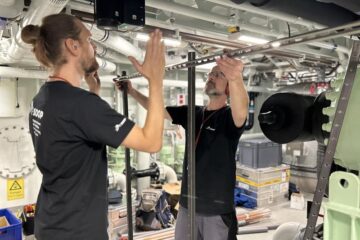Exclusions and Power Structures in the Wake of an Open Higher Education System

Since the 1990s there has a been a range of Swedish policy reforms calling for Swedish higher education to be more open, flexible and accessible.
New governance
In particular, notable importance was placed on distance and IT-based education. While the issue of access to higher education has long been viewed as an important factor in educational policy, a partly new approach to governance took shape during the 1990s and beyond.
Annika Bergviken Rensfeldt's study examines how the reasoning behind the openness in distance-based and higher education was set out in Swedish educational policy documents between 1992 and 2005.
Obligatory participation
“There's not only a clearer focus on individuals. Having previously spoken about the right to education and creating a higher education that is representative and that meets the needs of different student groups, there is then a shift in policy rationality that individuals should, or are even obliged to, participate in higher education.”
The study contributes to this debate and the understanding of the reasoning behind accessibility to and participation in higher education. It shows how the ideas of expanding education and making it more flexible also affect and govern the choices of students, institutions and education systems. The study notes that even good reformatory intentions involve issues of power and governance.
Exclusion
“Although this involves governance that is based on voluntary choices and students and institutions accepting these ideas, power orderings and exclusions are nevertheless created. Take, for instance, the strong political interest regionally in encouraging women to participate in distance education and flexible learning through local learning centres and IT-based education. This sort of rhetoric excludes them from campus-based education and often from higher-status institutions and career paths such as research. This results in a differentiated higher education system,” says Annika Bergviken Rensfeldt.
The thesis has been successfully defended.
For more information, please contact: Annika Bergviken Rensfeldt
Tel.: +46 (0)31 786 28 23
E-mail:
annika.bergviken-rensfeldt@gu.se
Media Contact
More Information:
http://hdl.handle.net/2077/23742All latest news from the category: Science Education
Newest articles

Cruise Ship as Data Collector
New Approaches in Ocean Observation… Scientific research – not only confined to dedicated research vessels but also from non-scientific vessels and marine infrastructures. This is one of the ideas promoted…

Experiment opens door for millions of qubits on one chip
Researchers from the University of Basel and the NCCR SPIN have achieved the first controllable interaction between two hole spin qubits in a conventional silicon transistor. The breakthrough opens up…

Economies take off with new airports
A global study by an SUTD researcher in collaboration with scientists from Japan explores the economic benefits of airport investment in emerging economies using nighttime satellite imagery. Be it for…





















